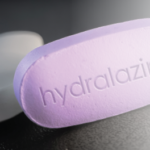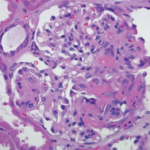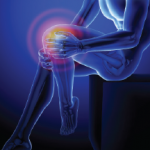After treatment, she was able to come off a ventilator, with plans for a kidney transplant, but while in the operating room to have sections of infarcted bowel removed, a rare Mucormycosis fungal infection was found in her digestive tract—just the second case in more than 100 years of record-keeping at Hopkins. This prompted her doctors to halt immunosuppression, but within two days, the infection had eaten away her stomach. In a subsequent operation, she went into ventricular fibrillation arrest and couldn’t be resuscitated.
“Do you ever go to funerals of your patients?” Dr. Petri said. “I went to her funeral.”
Dr. Petri described the disease and a new way of thinking about it that could help lead to better treatment. CAPS, which accounts for just 1% of all antiphospholipid antibody syndrome, involves three or more organs, systems or tissues; manifests in a week; involves small-vessel occlusion; and requires lab confirmation of antiphospholipid antibodies. It has many triggers, including infections, drugs, SLE flares, obstetric causes and trauma. Many serious features appear in CAPS that rarely appear in regular APS, including acute respiratory distress syndrome, a comatose state, encephalopathy, congestive heart failure and cutaneous necrosis.
The initial therapy includes triple treatment with IV methylprednisolone, IV heparin and plasmapheresis or, if the patient isn’t stable enough for that, intravenous immunoglobulin.
A new treatment approach could be emerging, Dr. Petri said. “I want to introduce you to a whole new way of thinking about [CAPS],” she said. “I think there’s a new diagnosis out there. Rheumatologists will be part of this. And it’s called complementopathies.” Better known complementopathies include paroxysmal nocturnal hemoglobinuria and atypical hemolytic uremic syndrome.
But, Dr. Petri said, CAPS is also a complementopathy involving the alternative pathway of complement being dysregulated. APS is largely due to autoantibodies that target beta-2 glycoprotein, a homologue of Factor H, a complement control protein.
Traditionally it’s taken weeks to wait to get back results to know whether a patient has a complementopathy. But researchers at Hopkins have developed a test called the modified Ham test that can give you the answer is just four hours. A treatment exists for complementopathies: eculizumab, although Dr. Petri acknowledged the exorbitant price tag of $500,000–750,000 a year.
Dr. Petri has anecdotal experience that rituximab could help. A middle-aged woman with APS who had cutaneous gangrene had failed triple therapy and was finally put on rituximab. The cutaneous gangrene stopped spreading. Then, after several days in a coma, she woke up.


